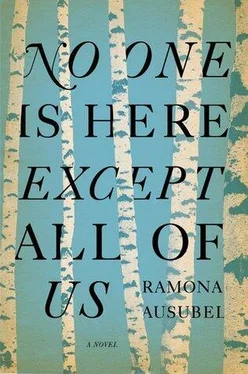Our house was made of wood, the roof shingled. It had a big room with two beds — one for our parents and one for us. The floor was covered in worn rugs and the woodstove had a deep layer of ash. We had a table and a stack of pots, pans and bowls. We had a beautiful old box full of silverware that we never used because it was too nice. I did not own anything — everything I had was shared. The soft baby blanket we children had each used, the pencils and paper, the marbles, the scissors.
On the second morning of the world, my mother ladled cabbage into everyone’s bowls. My father kissed her on the forehead, and Moishe teased, “The most beautiful woman in the world.”
“How do you know what I’m going to say?” our father said, smiling. “It’s not the same world as before.”
“There is no before,” said Regina, joining in.
“The most beautiful woman in the new world,” I said, patting my mother on the knee.
“That’s right,” my father said.
“The luckiest woman. The most beautiful family,” my mother corrected. In the seconds of silence that followed, the room was electric with happiness. The most beautiful family could feel it pop on our tongues, in our ears.
My mother went out into the market with all the women who carried their baskets and their lists. They squeezed the tomatoes, smelled the melons, peeled the husks back from the corn to check for bugs. They eyed plucked, hanging chickens, passed the chocolate squares and peppermint sticks without a thought. Women left the shops with the tinking sound of a bell hung in the doorway. At home they took the pins out and let their children brush their hair, let us create messy braids.
My father had been born with the job of picking cabbages. In the field he worked, the muscles in his huge arms like raw chickens. His skin was dark and cracked as if ready to split open and reveal the slick pink pulsing and twitching beneath. As he worked that day, rainwater falling into his eyes, he told stories to himself about how good he was at his job. “Mister Vladimir,” he said to himself, “you have no idea how talented you are at farming cabbages. Truly, no one has ever known them as you do.”
In his fantasy, if the money started rolling in, he thought he would buy himself a fine hat and a coal-black coat and the same for his three children. His fields would be so huge, so populated with cabbages, and he would build a house right in the middle of them, the rows radiating out from it. The cabbages would smile, knowing smiles, their rooty bodies lodged in the earth with only their brainless skulls to look around, appreciating what luck they had to grow in such a nice field, to be harvested by such strong hands. My father would nod back at them, thanking them for the compliment. “No, really,” he would reply, “I’m the lucky one. I couldn’t do it without you.”
As the men walked home at the end of the day, my father among them, they thought about the wives they had come into the world with, the long brown waves of hair, blond curls, the silk of it. In their minds, the hair would cover them completely. Impossible amounts of it falling from the heads of women, making seas and nests and beds. They snarled and snorted home, tugging at their own rough beards.
But my parents had a secret. My mother was glowingly, shiningly bald. Her hair had disappeared in a matter of a few weeks when she was a teenager and she had worn a wig every day since. It was not the fact that my father fell in love with her, but that he did not fall out again when he saw her uncovered head that made her trust him implicitly.
Because the world was new, people were sizing themselves up, taking stock of what they had and what they lacked. Most families in Zalischik had just about enough, but we all assumed that the rest had more, and in some respects, we were right. Some had more money, some had more sex, and some had more babies. My mother had more cabbage. There were cabbages all over the house. There were cabbages in bowls on the table. There were cabbages in a bowl under my parents’ bed. There were cabbages on the shelves next to our basket of leftover balls of yarn and the box of pencils. There were cabbages in the washbasin that had to be taken out when someone needed to clean the dishes or wash her face. There were cabbages in the bassinet, since the house was babyless now. And of course there were always cabbages in the pot, cooking.
My mother stirred them at the end of the second day, her children and husband drawing each other on the floor and laughing. “I am not nearly that ugly!” my father said, laughing at Moishe’s picture. “Look at my nose and look at this man’s nose!” Regina and I could hardly breathe through our laughter. I drew our father with twice the nose my brother had drawn and presented it to my sister, who rolled backward and held her stomach. Our mother watched the show while she stirred, ladled and set dishes on the table.
“Supper,” she said, plinking the edge of a bowl with a spoon.
“Somebody say a prayer,” our father instructed, while he spread my napkin over my legs. He took out a slip of paper to write down the prayer, which would be folded into a square and deposited in the box.
“Bless Dad’s nose, bless the soup, bless the family, bless the world,” I said.
“Amen,” the rest of them echoed, and we dipped our spoons.
In the light of morning , the jeweler asked, “Tea?” and the stranger said, “I don’t know.” The stranger wanted to offer her thanks, but could not find the strength. “Thank you for coming to stay with me,” the jeweler said. “I have been alone a long time.” The stranger managed to meet his eye for a second before it began to hurt, like looking into a bright light. The jeweler squirmed as he tried to think of something to talk about. With no history, conversations were harder to start. “It’s raining,” he finally said, as if she had not been aware.
“I’m sorry,” she told him.
“For what?” he asked, but she continued to stare into the distance. “You have nothing to be sorry for.” Please be happy, he thought, but he had no way to explain, even to himself, his affection for her, for the peculiar presence of her. He did not understand the stranger at all, but that seemed to have no bearing on his feelings. “You are like a shell,” he said. “A seashell. Hollow but beautiful.”
“Hollow.” She nodded. He steeped the tea, pulled the basket of dripping leaves from the cup and put it in the washbasin. He stirred in sugar and cream and handed the steaming cup to the stranger. To his surprise, she reached out, took it from him, wrapped her hands around it. Gratitude filled them both silently up.
For the rest of the day they sat not far from each other, gazing out the window at the light shifting almost imperceptibly. The jeweler added logs to the woodstove and prepared things to eat: buttered bread, canned apples, slices of cheese. He boiled and poured water, washed the cups when they were empty. “I like beets,” the jeweler said, wanting to talk. The stranger did not look at him, but he felt her absorb this fact. “I think they are perfect,” he continued, because he wanted her to know him even while he could not think of anything important to say. “This cushion,” he said, holding up a stained yellow thing, “means nothing to me. I don’t know where it came from. I wouldn’t miss it if it were gone.” The stranger listened, he knew she did, whether or not she acknowledged it. While the jeweler talked, they sat there and let themselves be objects on which dust might settle, air might brush past, light could play.
That night, the stranger did not sleep. She could feel her veins fighting to keep blood moving despite there being no apparent reason to do so. The pumping in her chest was a labor, a wheeze. What dark room had she washed up into? What lost place was this that had, at the sight of her, reset the clocks and begun anew? The first day she had felt like a ghost, like a dead person. As night wore on and dawn seeped into the room, she saw the endless days ahead lined up, waiting to be lived in. None of them would let her politely decline to attend, claiming illness or devastation. She could not avoid being alive for one rotation here and there. She had watched her husband’s face catch on fire and seen her children led out into the woods where a thousand gunshots rang out. Why did I survive it? she wondered. It was so simple — she had hidden behind the woodshed. She peeked out, dumbstruck, the scene before her impossible to believe.
Читать дальше












